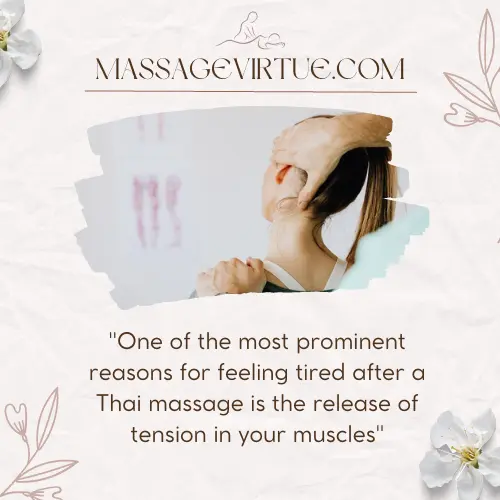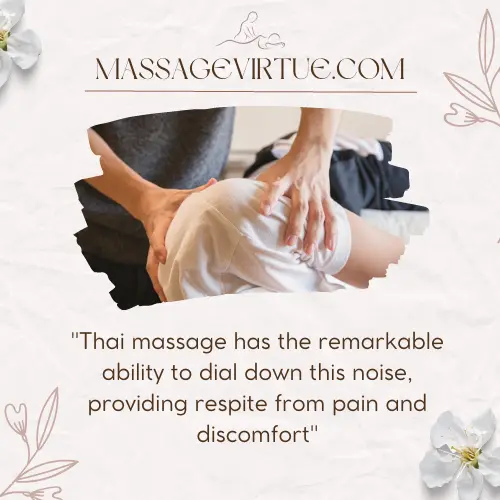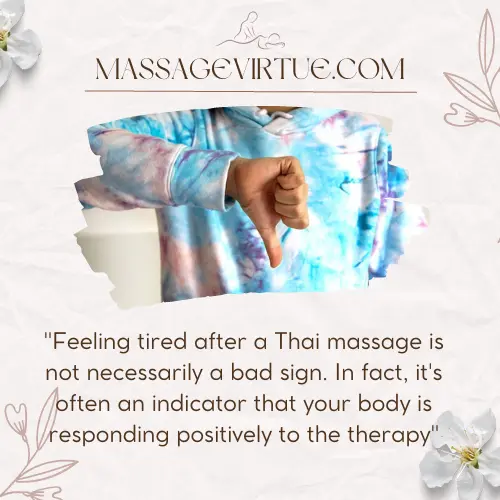Thai massage, with its unique blend of stretching and acupressure, is renowned for its ability to rejuvenate both body and mind.
However, have you ever wondered why you sometimes feel tired after this invigorating experience?
In this comprehensive exploration of post-Thai massage tiredness, we’ll delve into the intricacies of this phenomenon and the numerous reasons behind it.
You’ll discover that this fatigue is often a sign that your body is responding positively to the therapy. Let’s journey through the details.
Can Thai Massage Make You Tired?
Indeed, Thai massage can leave you feeling tired, this is because it involves deep muscle work, stimulates energy lines, releases toxins, induces deep relaxation, and improves blood circulation. These combined effects can lead to temporary fatigue, indicating that your body is responding positively to the massage. Let’s uncover the reasons in detail.
9 Reasons Why Thai Massage Can Make You Tired
After a Thai massage session, it’s not uncommon to experience fatigue. This tiredness can be attributed to several factors, each contributing to your overall sense of relaxation and well-being.
1. Due To Sore or Aching Muscle
One of the most prominent reasons for feeling tired after a Thai massage is the release of tension in your muscles.
During the session, your skilled therapist employs a variety of stretching and acupressure techniques, which can lead to the release of built-up muscle tension.

This newfound relaxation in your muscles can leave you feeling physically tired, akin to the fatigue that follows a satisfying workout.
Picture your muscles as a tightly coiled spring, holding onto stress, tension, and discomfort. Thai massage gently and systematically unwinds this spring, allowing your muscles to relax fully.
As they release their grip on tension, you may feel a profound sense of relaxation but also a sensation of physical tiredness.
It’s a sign that your body is letting go of stored stress and embarking on a journey toward rejuvenation.
2. Deep Relaxation
Thai massage is designed to promote deep relaxation. It’s not merely a physical experience; it’s a mental and emotional journey into tranquility.
The massage activates your body’s parasympathetic nervous system, often referred to as the “rest and digest” mode.
This state of relaxation can induce a sense of calm and tranquility, but it can also lead to feelings of tiredness, especially if you were carrying stress or tension before the session.
Imagine your parasympathetic nervous system as a soothing lullaby, guiding your body and mind into a state of profound relaxation. It’s during this state that healing and restoration occur.
However, like a deep slumber, it can leave you feeling a bit drowsy upon waking. Post-massage tiredness is a testament to the effectiveness of the therapy in inducing deep relaxation.
3. Lowered Heart Rate
As your body relaxes during a Thai massage, your heart rate may naturally decrease. This slowing of the heart rate is a positive response to the therapy, as it signifies a reduced stress level.
However, it can also contribute to feelings of tiredness.
Consider your heart rate as the conductor of your body’s symphony. In times of stress, it beats faster to keep up with the demands of the day.
During a Thai massage, as the tension melts away, your heart rate follows suit, settling into a tranquil rhythm.
This gentle slowdown allows your body to conserve energy and focus on healing. While a lowered heart rate is a sign of relaxation and well-being, it can also make you feel a bit lethargic as your body adjusts to this new tempo.
4. Pain Relief
If you had any areas of discomfort or pain prior to your Thai massage, the relief provided by the session can be profound. Pain relief can be accompanied by a sense of fatigue as your body fully relaxes and heals.
Imagine pain as a constant source of background noise in your life. It’s there, persistently demanding your attention and energy.

Thai massage has the remarkable ability to dial down this noise, providing respite from pain and discomfort.
As the pain subsides, your body’s natural response is to relax deeply and embrace the newfound freedom from discomfort. This relaxation can lead to a sense of tiredness as your body revels in the relief.
5. Reduced Stress Levels
Thai massage is an effective stress reliever. It helps lower the production of stress hormones such as cortisol and promotes the release of feel-good neurotransmitters like serotonin.
This reduction in stress levels can lead to an overall feeling of relaxation and, consequently, tiredness.
Think of stress as a constant hum in the background, like a persistent and distracting noise. Thai massage is akin to a mute button, silencing the cacophony of stress and allowing your mind to find serenity.
The reduction in stress hormones like cortisol is a positive response to the therapy, indicating that your body is letting go of the burdens of tension.
However, it can also lead to a sense of tiredness, as your body recalibrates itself in the absence of stress.
6. Due to Sleepiness
Thai massage can induce a state of drowsiness in some individuals. The combination of soothing touch, deep relaxation, and the potential for a warm and comfortable environment during the massage can lull you into a mild sleepiness.
Imagine your Thai massage as a lullaby for your body and mind. The gentle, rhythmic movements, combined with a calming atmosphere, can create an environment conducive to rest.
It’s not uncommon for clients to drift into a light slumber during their massage, experiencing a tranquil interlude akin to a catnap.
This brief period of sleepiness can persist after the massage, leaving you feeling refreshed but also slightly tired, as your body transitions from sleep mode back to wakefulness.
7. Due To Headache
Occasionally, a Thai massage might trigger a headache, especially if you have underlying tension or pressure points in the neck and shoulder area.
While the headache itself can cause fatigue, it’s usually short-lived and followed by relief.
Picture your headache as a knot of tension in your neck or head, like a stubborn tangle in a ball of yarn.

Thai massage therapists are adept at unraveling these knots, but the process can sometimes trigger a temporary headache.
It’s a bit like detangling the yarn – you might experience a moment of discomfort before the relief sets in. This brief headache can leave you feeling tired as your body works to recalibrate and heal.
8. Nausea
In rare cases, individuals may experience mild nausea during or after a Thai massage. This sensation can be linked to the release of toxins from your muscles, which is a natural part of the body’s healing process.
Think of your muscles as storage units for toxins, like dusty corners of an attic. Thai massage is like opening those long-locked doors and letting fresh air in.
As the toxins are released and circulation improves, your body begins to flush them out. This natural detoxification process can occasionally lead to mild nausea, similar to how you might feel a bit queasy after cleaning a dusty space.
While it’s an uncommon occurrence, it can contribute to a sense of tiredness as your body eliminates impurities.
9. Redness or Skin Heating
During a Thai massage, some people may experience redness or a sensation of warmth on their skin. This can be due to increased circulation and blood flow to the treated areas.
While it doesn’t typically lead to tiredness, it can contribute to an overall sense of relaxation.
Imagine your skin as the canvas of your body, and Thai massage as the artist’s brush. As the therapist’s hands move with precision, they stimulate circulation, bringing fresh blood and oxygen to the surface.
This surge of circulation can manifest as redness or a gentle warmth, similar to the flush you might experience after physical activity.
While it doesn’t directly induce tiredness, it’s part of the overall relaxation experience that Thai massage offers.
Is Feeling Tired A Bad Sign?
Feeling tired after a Thai massage is not necessarily a bad sign. In fact, it’s often an indicator that your body is responding positively to the therapy.

It’s essential to differentiate between healthy post-massage tiredness and exhaustion due to discomfort or overexertion. Post-massage fatigue usually signifies that your body is in a state of deep relaxation and healing.
How To Help Your Body Recover
While post-Thai massage tiredness is generally a positive sign, there are ways to support your body in its recovery:
- Hydration: Drink plenty of water to help flush out toxins and stay hydrated.
- Rest: Allow yourself time to rest and fully absorb the benefits of the massage.
- Gentle Activities: Engage in light, gentle activities like walking or stretching to promote circulation.
- Listen to Your Body: Pay attention to your body’s signals and rest if you feel the need.
How Long Should I Feel Tired After Thai Massage?
The duration of post-massage tiredness varies from person to person and depends on factors such as the intensity of the massage and your individual response. For most people, this tiredness lasts for a few hours to a day.
Consider post-massage tiredness as a gentle afterglow, like the warmth that lingers after a beautiful sunset. It’s a reminder that your body is undergoing a process of rejuvenation and restoration.
While the duration may vary, it’s usually a temporary sensation, a brief interlude of tranquility in your day.
How Long Should You Rest After Thai Massage?
The recommended rest time after a Thai massage is typically a few hours. This allows your body to fully absorb the therapy’s benefits and provides a gentle transition back into your daily routine.
However, this can vary depending on your individual response and comfort level.

Think of this post-massage rest as a nurturing pause in your day, akin to a leisurely cup of tea on a quiet afternoon.
It’s a moment to savor the sensations of relaxation and healing before gradually returning to the world outside.
Conclusion:
Post-Thai massage tiredness is a common and often welcome sensation. It’s a sign that your body has entered a state of deep relaxation, and it’s in the process of healing and rejuvenating.
Instead of resisting this feeling, embrace it as part of your wellness journey. Listen to your body, provide it with the rest it needs, and allow the therapeutic effects of Thai massage to continue benefiting your physical and mental well-being.
In the delicate balance of relaxation and rejuvenation, tiredness is a reassuring sign that your body is responding positively to the care it deserves.
Post-massage fatigue is not merely a sign of relaxation; it’s a testament to your body’s resilience and capacity for healing.
So, the next time you feel a bit tired after a Thai massage, relish in the knowledge that your body is on a path of well-being and rejuvenation. It’s a journey worth embracing.

